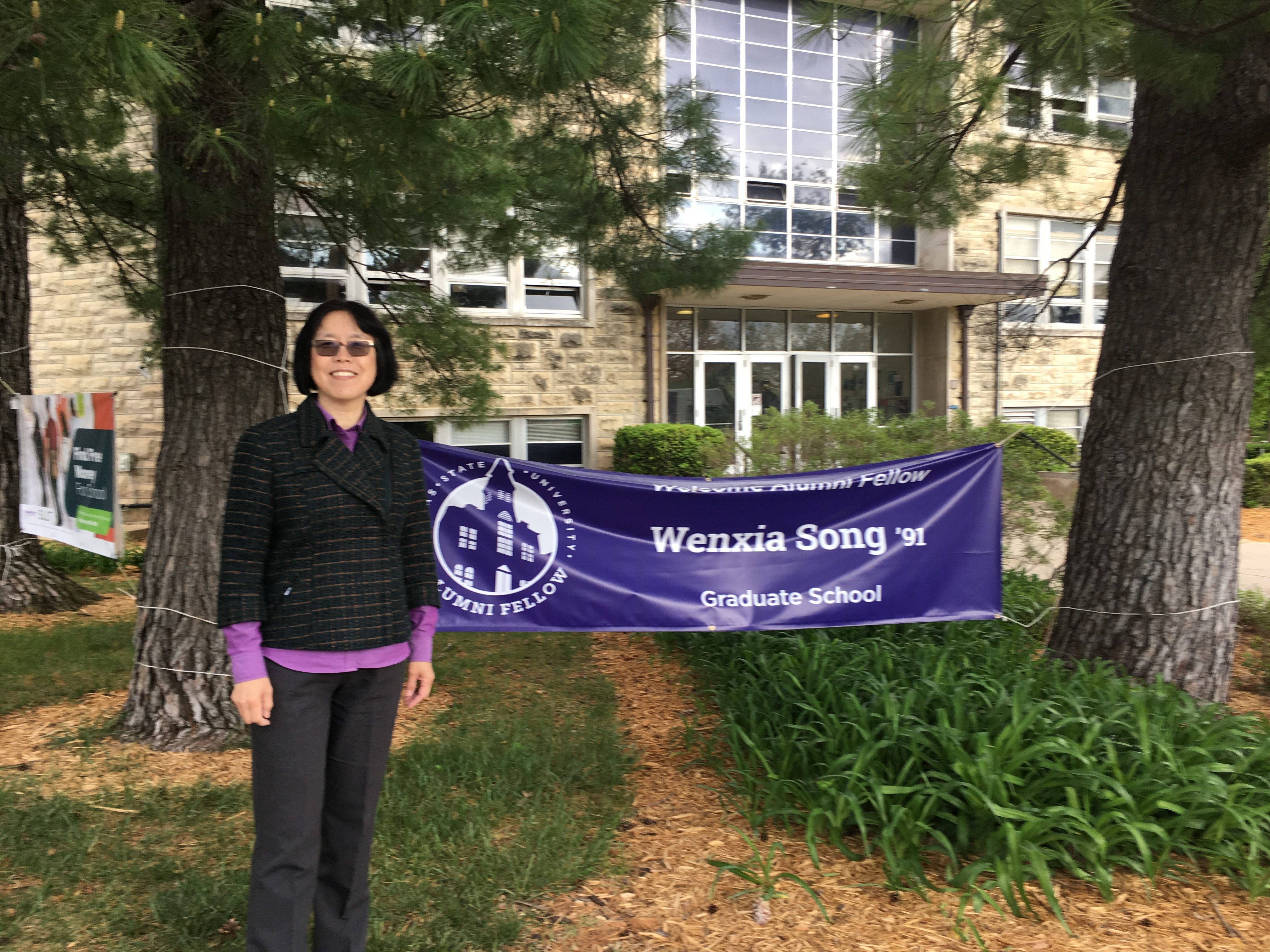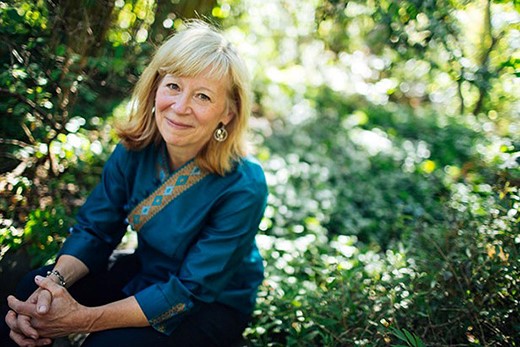The Graduate School welcomed back to campus Dr. Wenxia Song, 91’ as part of the Alumni Fellow week on April 17-21. The K-State Alumni Fellows Program, sponsored by the Deans Council, the President’s Office, and the Alumni Association, recognizes alumni who have distinguished themselves in their career.
While Dr. Wenxia Song was back on campus, she met with K-State administrators, graduate students and faculty within the biochemistry and molecular biology departments. Song networked and discussed her career path with graduate student leaders in the Graduate Student Council and students within the Biochemistry department. Song presented the seminar “The mystery of Neisseria gonorrhea infection in the human female reproductive tract” to the campus community. She had the opportunity to meet with her major professor, Dr. David Rintoul and members of her supervisory committee. The Alumni Association closed the Alumni Fellow week by hosting a reception and banquet for all of the alumni fellows and their guests.
Dr. Wenxia Song, outside of the Graduate School office of Eisenhower Hall, during Alumni Fellow week
Wenxia Song is a professor of Department of Cell Biology and Molecular Genetics at the University of Maryland, where she has devoted her career to advancing STEM education and engaging in scientific research. She has trained 14 doctoral, 7 master’s, and 28 undergraduate researchers.
“I get excited to teach and work with my students on various experiments,” said Dr Wenxia Song. “I teach my graduate students to think like a scientist, question everything, instead of believing in everything.”
Her research explores the immune protection against infectious diseases. She has published 68 research and four education articles and has one patent application. She has served on numerous journal editorial boards and research funding review boards. She was the Scholar and Research Honoree in the University of Maryland twice and the Outstanding Mentor of the McNair Scholar in 2016.
“My major accomplishments have been that I created a niche in my research program and then I did my research job very well,” said Song. “My K-State advisors laid the groundwork to help me be competitive and a hard researcher.”
She received her bachelors of science in biochemistry from Jilin University, China in 1983, MS from Institute of Biophysics, Chinese Academy of Science in 1986, and then Ph.D. in biochemistry in K-State in 1991. Her husband, Kangyan Du, received post-doctoral training in chemistry in K-State. Her son was born in K-State in 1990.
Since 1983, the Alumni Fellow program has brought successful alumni back to campus to meet with students and faculty and share their expertise in the classroom and at informal settings.
Fellows are chosen by each college to return as distinguished guests and mentors, friends and counselors. They are honored in recognition of the ultimate measure of a university –not curricula, facilities or program, but the quality of its alumni. Learn more about the Alumni Fellows program.
Geraldine Richmond, highly recognized scientist, earned honorary doctorate award
A Kansas State University alumna and 2016 recipient of one of the nation’s highest honors, the National Medal of Science, received an honorary doctorate from the university.
Geraldine “Geri” Richmond earned a bachelor’s degree in chemistry from Kansas State University in 1975. She went on to earn a doctorate in physical chemistry from the University of California, Berkeley, and now serves as presidential chair in science and professor of chemistry at the University of Oregon, where she has been a faculty member since 1985.
The awarding of the honorary doctorate follows approval by the Kansas Board of Regents. It is one of the highest honors the university can give. Richmond was recognized as the commencement speaker for Kansas State University’s Graduate School at 1 p.m. on Friday, May 12.
“Dr. Richmond has distinguished herself in every aspect of her career and is most deserving of this high honor from Kansas State University,” said April Mason, the university’s provost and senior vice president. “A Kansas native, she has had a remarkable career that has earned her top scientific honors and recognitions for her research and for her service to the advancement of science, including the advancement of women in the STEM fields.”
Richmond received the National Medal of Science from President Obama in 2016. Established by Congress in 1959, it is presented to individuals deserving of special recognition for their outstanding contributions to knowledge in the physical, biological, mathematical or engineering sciences.
Her work, which uses laser spectroscopy and computational methods, helps to better understand the chemistry that occurs at a complex surface like liquid water. The research has relevance to environmental remediation, biomolecular assembly, atmospheric chemistry and alternative energy sources.
“Our greatest accomplishments have been in discovering the molecular characteristics of water surfaces themselves and environmentally important compounds that adsorb on water surfaces,” said Richmond. “My lab has also contributed significantly to developing new ways that state-of-the-art laser systems can be used to study liquid surfaces and the coupling of computational methods with our laser based experimental methods.”
Richmond has been recognized for her research with membership and leadership roles in several of the nation’s most prestigious scientific organizations, including the National Academy of Sciences and the American Academy of Arts and Sciences. She is a fellow of the American Chemical Society, the American Physical Society, the Association for Women in Science and the Association for the Advancement of Science, the world’s largest general scientific organization, where she just finished a term as president and now serves as chair of the association’s board.
Among Richmond’s current leadership roles include serving on the National Science Board, to which she was appointed by President Obama; and her appointment by Secretary of State John Kerry as U.S. science envoy to Vietnam, Laos, Cambodia, Burma and Thailand. Richmond also is the founding and current director of the grass-roots organization COACh, which was formed in 1998 to assist with the career advancement of thousands of scientists and engineers in the U.S., Asia, Africa and Latin America.
Along with the National Medal of Science, Richmond has been recognized with the Olin-Garvan Medal, Joel H. Hildebrand Award, Charles L. Parsons Award and Award for Encouraging Women in the Chemical Sciences, all from the American Chemical Society. She also received the Davisson-Germer Prize from the American Physical Society and the Presidential Award for Excellence in Science, Mathematics and Engineering Mentoring, which is administered by the National Science Foundation on behalf of the White House Office of Science and Technology Policy.
Richmond reflected on her favorite memories while she was a student at K-State.
“I remember the first time I taught Freshman chemistry under the guidance of Dr. William Schrenk and then going on to conduct my first research project in Dr. Cliff Meloan’s analytical chemistry laboratory,” said Richmond. “That project involved developing snake repellants from hedge apples and bug insecticide, so to put on fake cow piles that were extracted from real cow piles. I recall learning how to blow glass, conduct gas phase experiments and learned what it meant to be a graduate student while working for several years under the guidance of Dr. Don Setser and his graduate students.”
Learn more about Kansas State University’s Honorary Doctorate Degree

